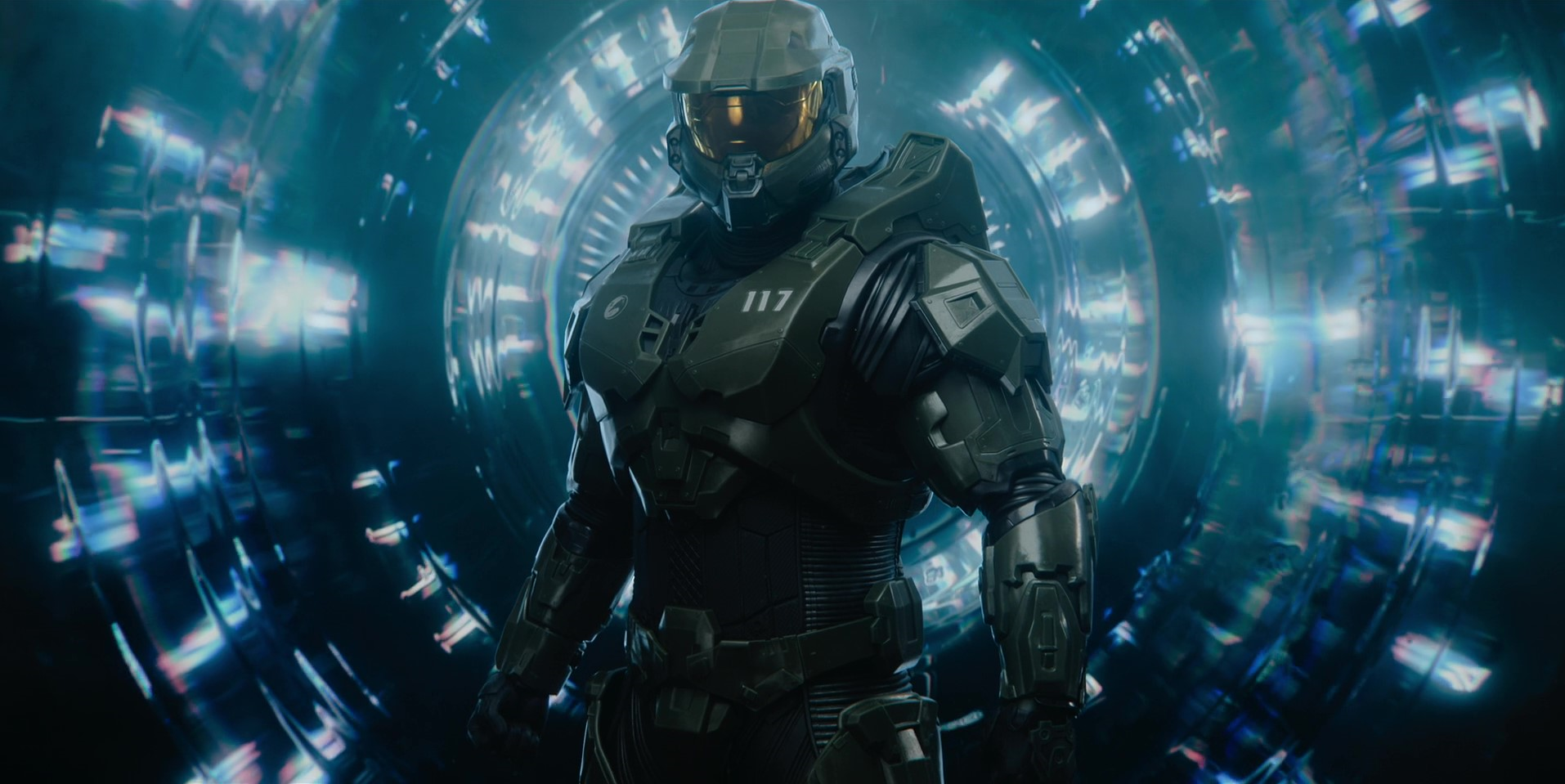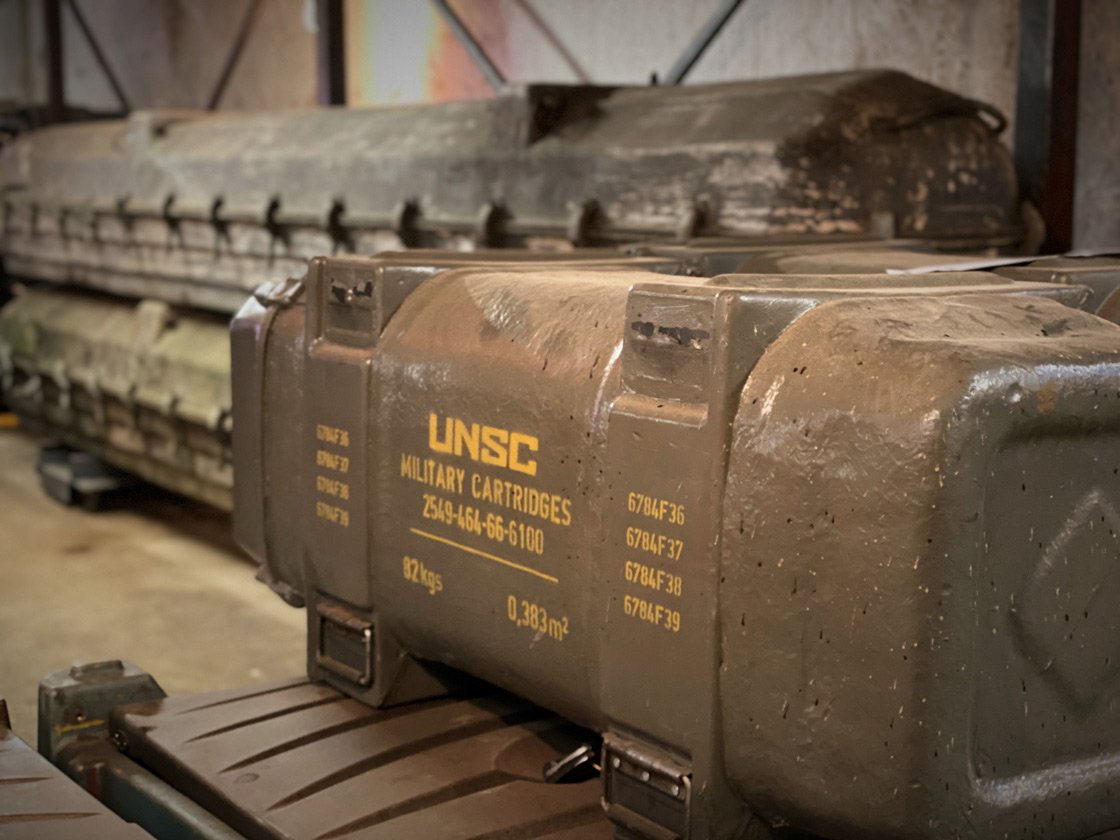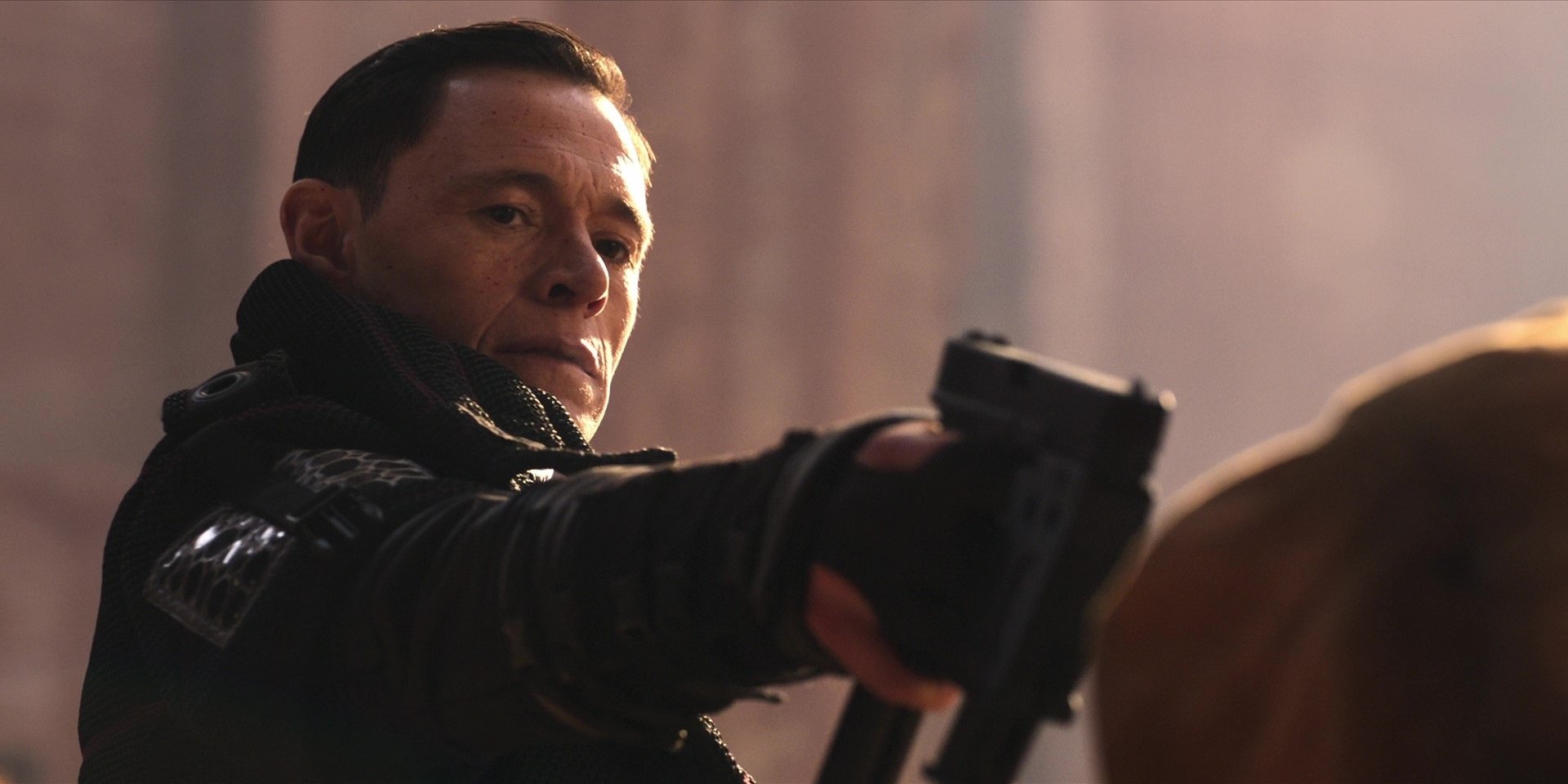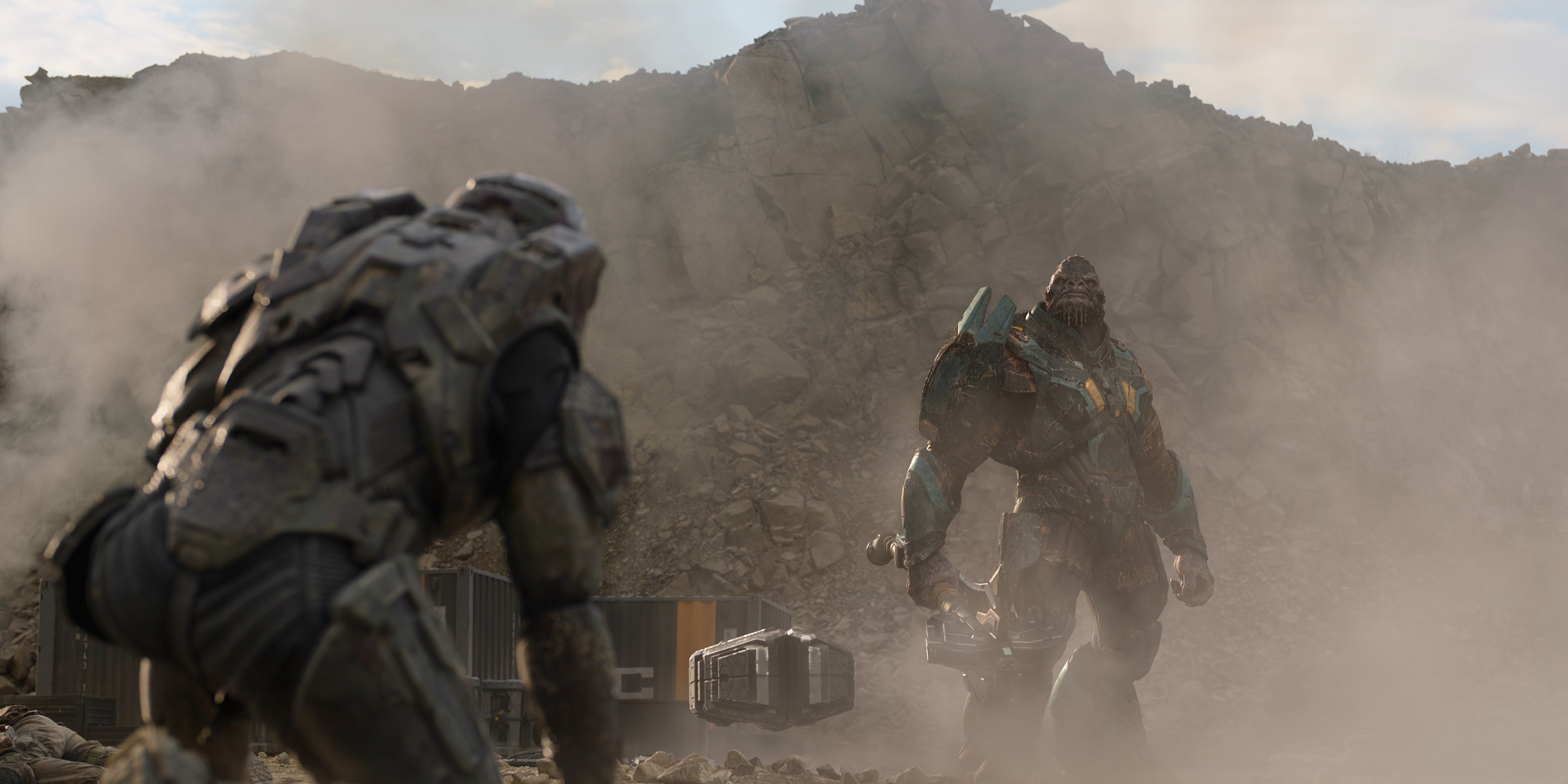“The most amazing thing for me is that every single person who sees a movie, not necessarily one of my movies, brings a whole set of unique experiences, but through careful manipulation and good storytelling, you can get everybody to clap at the same time, to hopefully laugh at the same time, and to be afraid at the same time.”
Be sure to check out Halo TV+, the latest podcast from Evolved covering every episode of the Halo Television Series including commentary, analysis, and a final season review!
Season one of the Halo TV Series is in the bag, and I have to say, after watching it all the way through with a very open mind, I think it failed. I think it failed to deliver a compelling story, and I think it failed at reproducing the themes and ideas that run so deep in Halo, particularly the original trilogy. The verdict is out whether it succeeded at bringing in new fans to the franchise, though considering the viewership of the show was apparently really good, it may have managed to succeed at least on that front.
Don’t get me wrong, there is a lot to the Halo TV Show that I have enjoyed immensely, but those parts were interspersed with far more parts I did not care for at all, and even more parts that I just did not understand the reasoning behind. It is not terrible by any means, but I don’t think I could call it a good show, even as someone who has been dying to see live-action Halo on the television for over a decade.
Now I don’t want to leave the reader with just a rant, as I personally cannot stand seeing people on social media attack the show’s cast and crew without providing context and constructive criticism. There are good aspects to the show, and I am hopeful that the showrunners can correct a lot of the mistakes from season one and deliver a much stronger and more compelling season two, whenever that lands. I also want to provide my thoughts on what I think the show should have been out of the gate, now that I have been able to digest Halo’s first attempt at a real non-canon entry into the franchise. I have a lot running through my head, so lets hope I can manage to get it all written down without making you, the reader, roll your eyes to the back of your head in exhaustion.
Related Media
The following article will discuss major plot points related to season one of the Halo TV Series.
What the Show Got Right
Before I dig into all the part of the show I thought were outright failures, I am going to cover the parts that I think the show got right. If you are one of those people who just wants to read someone bashing the TV series, skip to the next section, though I would urge you to read through this section as well and see whether you agree with my assessment on the good parts of the show. You may fervently disagree with my opinions, or you may remember something else I completely forgot that was a highlight of season one.
The Spartan Program
Firstly, the plot following John discovering his past as a child and as a Spartan recruit was fantastic. I know a lot of people found these episodes (two through four) to be eye-wateringly boring, but this is the kind of character exploration and pace I really wanted from a Halo television show. The weird changes to the canon aside, John’s discovery of the truth behind what happened to him and his evolving relationship with Dr. Halsey were amazing to watch unfold. The realities of the Spartan program have mostly been mellowed in canon material, so while we always knew of the horrors of how the Spartans came to be, it was never presented with that much raw emotion. What Dr. Halsey did was not excusable in any reality, and the fact that we got to see her face what her actions wrought on the screen was a real gem of season one.
We also were able to see glimpses of the effects of the Spartan program on the Spartans themselves. The scars were a nice touch, but I am actually referring to the brief glimpses of the children on the operating table during the augmentation process. This has been seen in other Halo media, but seeing it live-action really hit a nerve for me far more than anything else I have seen or read in the Halo universe. As hard as it could be to watch, I really want the show to keep going back there to really drive home the horror of the Spartan program, so we don’t forget these adult supersoldiers were once kidnapped and abused children.
The Clones
This leads into the second aspect that I loved, which is cloning, both to create Cortana and to replace the abducted children for the Spartan program. Again, this aspect of both Cortana and the Spartans is just so ethically and morally disgusting, and we actually get to see just how awful it really is. That said, there are aspects of these parts that I questioned the writing decisions made, but overall the portrayal of just how terrible Halsey’s cloning programs are is laid bare during John’s flashbacks as well as during the Cortana creation scene. I will absolutely get into the parts of this I really did not care for in the next section, but I was thrilled to see that the writers didn’t gloss over what should be an impossibly contentious part of the Halo universe.
Using a fully human clone was a great change, and one I would expect to see again were this to ever be touched on again in a future live-action Halo entry. Having Halsey look into her clone’s eyes, her own eyes, and talk to her so coldly, then proceed to destroy her for the sake of progress really adds so much more emotion to what would otherwise be confusing and hard for an audience to really grasp on an emotional level. Cloning and destroying a brain, while fundamentally the same atrocity as what we see in the TV show, does not carry the same emotional weight as does seeing a human clone killed to create an artificial intelligence. I am not surprised but am glad they decided to go this route in the show, and it completely paid off in the end.
The Sets
Moving to the practical effects, I think the team did an astounding job building vast sets that I would have expected to be CG, as well as designing fantastic costumes and props that are used throughout the season. The Mjolnir suits look incredible, and the huge set pieces filled with warthogs, marines, weapons, and other supplies were mostly done fantastically, bringing the Halo universe to my television like I have never seen before. Like the first two positive aspects, this one is not without fault, and again I will cover all the parts of it I did not like in the next section.
Episode five in particular caught my attention just because of the scale involved. I suppose maybe it is more CG than I realize, but as far as I could tell the entire base, minus the ships, were part of a physical set, which means the producers put a lot of time and effort into building that set which ultimately only appeared in that single episode. This was a great choice, and it really brought a sense of reality to the show that I don’t think would have been there if the set had been CG.
The sets were very well done and were probably one of the best parts of the entire season one.
What the Show Got Oh, So Wrong
So not that I have established that there are significant parts of the Halo show that I thoroughly enjoyed, I am going to dig deep into all the parts I either did not like or outright hated. I say this because, frankly, there is a lot more that I didn’t like than I did. I really tried to accept the decisions made early on in the season with the assumption that they would payoff in the end, but knowing now that most of those questionable decisions did nothing to build a compelling story, I cannot let them by with a free pass.
The Pace
I am just going to come out and say it, the pace of this show is terrible. And before you shout in agreement that the show was too slow, I am going to posit that the show is way too fast! No, seriously. While nearly nothing of significance happens throughout basically the entire season one outside of the Forerunner macguffin, the plot still develops way too quickly. Episode one may have been the most egregious, and while I forgave the writers who I knew were trying to pander to the core Halo fandom, the introduction of characters, themes, and relationships happen so quickly that there is little room to really get drawn into the universe’s story. We meet Kwan, her dad, the insurrectionists, Silver Team, and the Covenant all in the first scene! By the end of the episode we have been introduced to Jacob and Miranda Keyes, Admiral Parangosky, and Dr. Halsey too, leaving just Soren-066 as the only main character not seen in the first episode. There is just way too much being thrown at the viewer in episode one, and while the pace slows down in subsequent episodes, it picks back up mid-season and never looks back.
Starting at episode five, the show really picks up steam again. While I really enjoyed episodes two through six, I have to admit that the plot points that develop in episode five start the ball rolling to the wild conclusion that left me rolling my eyes at for nearly all of the last two episodes. I am for the action scenes by all means, but I am going to be completely honest in saying that the action scenes are not what differentiates Halo from other science fiction or first-person shooters. Everyone has action. What makes Halo unique is the story about the struggle. The struggle to fight for humanity’s survival and the struggle to come to terms with the fact that the Spartan program is both one of the most egregious crimes against humanity and the only thing that saved humanity from total annihilation. Most casual fans haven’t delved into the backstory of Halo at all so that second part is missed entirely, but it is constantly hanging over everything that happens throughout the Human-Covenant War and beyond.
What’s more, as was so eloquently described in the Halo 4 prologue cutscene, “You (Dr. Halsey) developed the Spartans to crush human rebellion, not to fight the Covenant.” The story of the Spartans would surely be on par with anything done by, say, Red Skull in Captain America, a purely evil act, were it not for the timely appearance of the Covenant. That doesn’t absolve Halsey or ONI or anyone involved of their sins, but boy does it make for a compelling story! How do you deal with a person who should unquestionably be sent to the firing squad for her actions, yet is also the only reason humanity still exists? The TV show does manage to dive into that more in the middle of the season, but it kind of flies past it in favor of more action, to the detriment of the show I think.
The Compression
Along with the rushed pacing, the story compression is a serious detriment to the Halo series. If you aren’t sure what I mean by this, I am talking about how just about everything in the Halo story is compressed to fit within the TV show. Right off the bat we get to see a planet of insurrectionists who are completely unaware the Covenant exist, decades into the war with the aliens. This idea isn’t new, though, as we have seen it in multiple Halo novels that take place at or very near the start of the war. It’s a great way to introduce the Covenant to the audience, as a new reader would also be largely unaware of the Covenant, or at least the specifics of who they are at the onset of war with humanity. It allows for exposition that could otherwise feel very forced. This is all fine and dandy, and I like this aspect to the timeline.
But in the context of the Halo show it makes no sense. While we don’t know for sure how long the war with the Covenant has been going on in the Silver timeline, it presumably has been at least a decade or two as Makee is kidnapped as a child by the Covenant, who appears to be well into her 20s in present day 2552. So instead of being given a maybe forced plot exposition by a character describing the Covenant to someone who should know better, we are given this contrived plot thread that just comes off as confusing. I don’t want to say it is lazy writing because I am sure more effort was put into every aspect of the story than I could possibly understand, but I think it is just a poor decision by the writers and/or the showrunners.
The compression continues thematically in the first episode as well. We are introduced to the UNSC in the second half as John speeds towards Reach with the artifact, but then and throughout the entire first season the UNSC is presented as the placeholder for the entire human military complex. This is another simplification that I get from the standpoint of introducing new audiences, but completely ignoring ONI and their involvement in the Spartan program weakens Parangosky as a character and turns an otherwise complicated and contentious relationship between military power centers into a nebulous “evil government/military” organization. The presentation of the UNSC to the audience is basically just as a vessel to continue the John/Halsey plotline in the context of a broader conflict with the Covenant, and that really detracts from so much nuance that exists in the novels and even in the games to a degree.
The last part of the universe that gets compressed is travel time. This is not just a problem of the TV show as it has been a recurring theme of Halo content since the transition from Bungie to 343 Industries, but I personally cannot stand the change to a “globalized” galaxy, where planets are no longer months apart, but merely hours. While the original trilogy of games never expressly mentions this, you see it if you pay attention to the dates given and focus on the broader story being presented. As an example, the travel time from Reach to Alpha Halo (Halo: Reach to Halo: Combat Evolved) is nearly three weeks. A month elapses between CE and Halo 2. Nearly two weeks elapse between Earth and Delta Halo in Halo 2, and yet another two weeks go by between Halo 2 and Halo 3. Leaving Earth for the Ark in Halo 3 takes the Forward Unto Dawn almost four weeks.
These are all big time jumps that the casual player doesn’t even register, but they are meaningful in the context of the broader universe, and establish a galaxy where solar systems are within reach, yet still a significant distance away. If you are someone who isn’t familiar with the extended Halo universe you might be saying “who cares?”, but it does help to ground the universe in a way that makes this fictional world seem real, and helps explain some of the themes and plot threads that extend throughout Halo. Why are the outer colonies so against UNSC/UEG rule? Because they are literally months away from the inner colonies and have built a separate governance and culture from that of Earth and its nearby neighbors. Forget the physical distance, that doesn’t really matter in the context of colonial expansion. It is all about travel time.
This seemingly minor nuance of the universe starts to get lost once Halo 4 is released and has continued ever since, to my endless frustration. While it is true that there are over four years between Halo 3 and Halo 4 in the timeline, the plot of Halo 4 takes place over a total of five days. This includes traveling from Requiem to Gamma Halo to Earth. And yes, I know there are completely explainable reasons why this makes sense from a lore perspective, but it still takes away that important aspect of the Halo universe, and in my opinion it does so to the detriment of the series.
Faster-than-light travel is a key aspect of most science fiction, because it allows the story to progress in a universe that is so unimaginably vast that only having conventional propulsion would render interstellar travel impossible for the individual. As someone who much prefers adherence to physics whenever possible, I am accepting of this exception because without it, all science fiction stories would be confined to a single solar system. Insisting that travel time is still a non-trivial amount, however, keeps that aspect of the fictional universe as an impactful factor in how the story develops and grows. Yes, humanity can spread amongst the stars, but not without straining against the realities of being weeks or months apart from each other.
This thematic change continues in Halo 5 and beyond, and while again I understand the plot reasons why it makes logical sense, it still detracts from the narrative. The exact same goes for the TV series. While distances and timeline are not extremely clear in the show, it is heavily implied that traveling from Madrigal to Reach in a Condor only takes a few hours. Madrigal is basically a backwater mining town with heavy insurrectionist ties, yet the human capital on Reach (as it is presented in the show) is only a couple hours away. There is no plot reason why any type of insurrection shouldn’t have been put down hard long ago on Madrigal. And more importantly, there is no real reason why an insurrection should have gathered steam in the first place.
As I said before, the in-universe reason the insurrection grew was due to the time distance between the outer colonies and Earth. They were forced to self govern, and as the years and generations went by, the outer colonies grew apart from the UEG/UNSC, and demanded more autonomy. When that was denied, resentment and rebellion began to grow. Being that UNSC and UEG command was literally months away, they were unable to effectively contain the growing hatred and the insurrection was born.
Does any of this matter to the story told in the Silver Timeline? No, but actually yes. Sure, this world-building nuance can be ignored for the sake of simplicity, but when you state that the intent of the Halo TV series is to build a believable narrative world (or in this case rebuild) in a similar manner to Game of Thrones, the reasoning and intentions behind characters’ actions is important for the viewer to get invested in the story. The excessive compression done by the showrunners has completely removed the minor parts of the Halo universe that make it a unique and lovable world.
Silver team, standing around in their sexy AF Mjolnir. This was the best part of season one, hands down.
The Simplification
This complaint will sound similar to my previous rant about narrative compression, because it is in the same vein to the ideas I discussed there. While I mentioned earlier that I really enjoyed the show’s portrayal of Halsey and the terribleness of the Spartan program, even these parts had issues I couldn’t help but mention. Were it not for all the other issues I probably wouldn’t have made a big deal about these, but given the context I can’t help but mention them. I think these issues are all related to the same underlying problem with the TV series, which I will get into in just a bit.
Like I said before, I was thrilled to see the Halo TV show really dig into the immorality of the Spartan program. The only other time this has really been pursued in any meaningful way in the lore was in the Kilo Five Trilogy of novels, and that entry into the canon was met with complaints from fans who thought it was too one-sided and tried too hard to absolve everyone other than Halsey of the original sin of the Spartans. Likewise, the TV show falls into the same trap, placing the blame (rightly) onto Halsey’s shoulders, but effectively forgiving everyone else involved as merely pawns in her plan.
To be fair, Keyes doesn’t totally get off scot-free, but his repentance is presented in such a way that the immorality of the Spartan program doesn’t rub off on him. The same can be said for Parangosky too, who, while written as a hardened military officer, is still presented as someone who isn’t responsible for kidnapping children and creating child-soldiers. This blame narratively falls solely on Halsey’s shoulders, and any ambiguity as to who is the real villain is removed from the equation.
This is a theme around Halsey’s character throughout the show. She is conniving and scheming, which is really well done, but she is so one-dimensional her side of the argument never plays out. Not that Halsey has a leg to stand on morally or ethically, but that character conflict between Halsey and John just doesn’t ever build in any meaningful way. She is basically the wicked witch who has John under her spell right until the enchantment is broken and John is finally made aware of the wrongs that were forced upon him as a child and throughout his life.
This relationship has been handled so much better in the core canon that I the only conclusion I can come to is the show writers were afraid of giving Halsey’s character any chance to argue her side for fear of appearing to condone her actions. While in some respect I understand that fear, it is a bridge that has been crossed plenty of times before and could have been handled so much better and given Halsey’s character so much more depth. Viewers don’t see Walter White’s portrayal in Breaking Bad as condoning murder, gangs, and drug use. Everyone knows he is the anti-hero and while fans root for him throughout the five seasons, they also understand that his behavior is reprehensible and unforgivable. Walter White is such a beloved character because of that depth and because viewers can relate to him on some level.
Halsey should be the same. You know she is fundamentally wrong, but her character portrayal should be such that you believe she thinks she did the right thing, even if she understands her actions harmed hundreds of people. I don’t get that from the TV show Halsey. Clearly she stands by her actions based on her behavior on-screen, but that is where the conflict seems to start and end. She is the bad guy, she doesn’t care, so she fights back. No reflection on the weight of her actions. No throwing the accusations of severe child abuse back in the face of Parangosky and all the others who helped and supported the Spartan program. She is purely a sociopath who has no remorse or concern for anyone she has hurt along the way. This is not the nuanced Halsey of the core canon, and it is to the extreme detriment of the TV show.
Then there is Cortana. All the changes to her appearance aside, I have real problems with how her creation, development, and fit into the silver timeline were changed for the show. While I know the community has real issues with how she appears in the show, that part doesn’t really bother me. Clearly it was done that way to aid in dramatic effect, and understanding that the TV medium is far different than video games, I forgive the showrunners for any changes they made on that front.
My real issue with Cortana is how she fits into the broader Halo universe. AI runs deep in the core Halo story, not just as a plot device but as a vessel for exploring the nature of humanity. I completely get that Cortana is the focus of the show, but I couldn’t help feel like she was presented as the first AI ever created in the Halo universe. This is never said explicitly anywhere, but this is how the writing made the audience feel. On one hand this makes her character that much more special, but I think it is just another example of the writers oversimplifying the story for the sake of a new audience.
I am curious, though, how casual fans who are only familiar with the original Halo trilogy processed this part of the story. From the perspective of the first three games, Cortana is the only AI you ever see. So on one hand you might think that those fans would assume Cortana is the only AI in the Halo universe. This is not how I remember the original trilogy though. Not that there is some AI in the story somewhere, but the story of the games is presented with such a narrow focus on Master Chief and Cortana that the player isn’t given any information to make the determination. I always assumed there were other AIs, just based on this. Halsey never shows up in the trilogy, Cortana’s birth never does either, and aside from very small snippets that include John, the broader UNSC military complex is never fleshed out.
The TV show, meanwhile, does present the viewer with many scenes that do not involve John or Cortana, and in these it is clear there is no AI present, at least not one that takes on a corporeal form. No one in the UNSC is shown interacting with an AI at all, so it can be assumed that Cortana is the first. Of course this is not made clear so if one shows up in season two it wouldn’t be a retcon, but the writers clearly tried to simplify this concept for the viewer, and I think this seriously hurts the world-building and story depth of the TV series.
Everything Else
I could probably spend a lot more time listing the things in season one of the Halo TV series that bothered me, but since that might feel like beating a dead horse, I will just briefly mention the most egregious issues I had with the show that pop into my head. If there is something else that particularly bothered you, mention it in the comments. I don’t want this to turn into a hate-filled rant because I think there is a lot of good in the show still, so keep the comments respectful and thoughtful.
I wanted to care about Madrigal and Vinsher Grath, but this plot thread never really went anywhere.
Kwan Ha - This part of the story didn’t go much of anywhere and the places it seems like it is going in future seasons are not compelling at all for me.
Vinsher Grath - This just felt like more generic villain. Nothing about this part of the story interested me.
Miranda Keyes - She started to come into her own in the end of the first season, but she seemed way too meek overall. I get that Keyes is young and in a vulnerable position with her family, but I just never felt like I she was someone I wanted to root for. The actor who plays her, Olive Gray, did a great job with what she was given, but this could have been a lot better.
Silver Team standoff - The entire standoff in the last two episodes between the pelleted Silver Team and the reborn Silver Team was incredibly cliched and just felt weird. I did not like this part one bit.
The CG - I defended the CG for the most part throughout the season, but the last episode in particular looked awful and cartoonish. The animation of the Brutes reminded me of Claymation, and the entire scene overall seemed like they were trying to match one of those epic scenes out of Lord of the Rings, but came up way short. I get that their budget is much smaller, but if you can’t make convincing CG with the budget you have, don’t.
Makee - This is another one of those choices I defended at the outset, adding a human kidnapped by the Covenant into the story, but the execution was again poor. Her ties to John were interesting but didn’t really go anywhere, then they killed her.
The Ending - What the hell was that? So I guess we have silent Chief now because he is actually dead and his suit is controlled by Cortana, making him an actual robot? Why? To appease the fans that want silent Chief? First this isn’t silent Chief, this is dead Chief. Second, this will absolutely not appease any fans. This made no sense.
The Plot - The whole story in the first season is very messy and doesn’t really go anywhere. The first five episodes were pretty good overall, but after that the story seemed to kind of go off the rails and doesn’t really progress very well.
Reach City - Just… why? This has to be the laziest part of the entire first season. Again, I get the writers were trying to simplify the universe for new viewers, but just give it a real name, either New Alexandria, or any other already established city on Reach or just a new name that isn’t “Reach City”. I know, I know, there are plenty of other instances of lazily named cities and planets in Halo lore, and I don’t forgive those either. This is already an established planet with established city names. Reach canonically has a lot of Hungarian roots which is why so many of the locations have Hungarian names. The TV show was literally filmed in Hungary. Pick any city name from there and it would have been better than “Reach City”.
Atriox - At least in season one, choosing the main Brute to be Atriox is weird. This is non-canon, so whatever, but I struggle to imagine a fan who knows who Atriox is but doesn’t know the original trilogy story and those characters like Tartarus. Maybe I am too old and out of touch, but this decision seemed like it was trying to be fan service but failed. I feel like calling him Tartarus would have made a lot more sense in the story, and would have been much better fan service to the hardcore fans. Maybe this will all make sense in season two and I will eat my words, but I don’t have a ton of faith in the story progression at the moment.
Halsey’s Lab - I have said this before, but that lab is so absurdly generic it is laughable. The lab should have at a bare minimum had some personal effects including Halsey’s journal in it. The lab as presented it far too clean and just comes off as a generic science fiction setting.
The running/movement - Why did everyone look so weird running around? I chalked up the weird movements of the Spartans as due to the suits, but the weird movements continued to non-armored characters. It was mostly the Spartans though, and while I understand the why, it nonetheless took away from the show for me just a little bit.
I may not like that this is Atriox, but this was one hell of a scene and episode!
Wrap Up
I don’t want to seem like I hated the TV show, because I didn’t. I can’t say that I liked it though, and if this were any other franchise I would have stopped watching a while ago. I completely understand why the creators felt the need to create a story that focused on Chief and Cortana and the Covenant War, and I 100% agree with that decision. While I personally would have preferred a canon story, I still think the path ultimately chosen to create a parallel timeline was the right one based on the target audience and focus on an original trilogy-era story.
That said, the emotional beats of the original trilogy are totally missed in this show, and I struggle to see how season two and beyond get there based on where the story seems to be going. Again, I would love to be able to come back after season two and say I was completely wrong. I really hope I can. I just struggle to see that happening at the moment.
I was going to end this article by describing how I would have built the Halo TV series’ story, at least in broad strokes, but as this is already pretty long, I will save that for my next post. Check back on EvolvedHalo.com soon for my next article where I try to develop the Halo TV series if I was put in charge. To be clear, I am NOT a writer or in any way qualified to be developing a TV show, so it might be a total shitshow, but if nothing else it should be entertaining.
Really all I want at this point is for the TV show to right a lot of the missteps it took in season one, and to hopefully salvage a decent entry into the Halo universe, non-canonicity notwithstanding. If nothing else, this show should provide a good template for what does and does not work for a Halo TV show, and perhaps in the future we will get a better entry, or maybe a core canon show, or maybe this will spread the brand enough that something like an ODST-focused Band of Brothers-style show would be a success. There are a lot of good bits in the TV series, they are just too far apart for me to consider this show a good Halo show or even just a good show. My hope for better Halo on the TV or big screen remains very strong, though perhaps slightly weaker than it was a few months ago.











